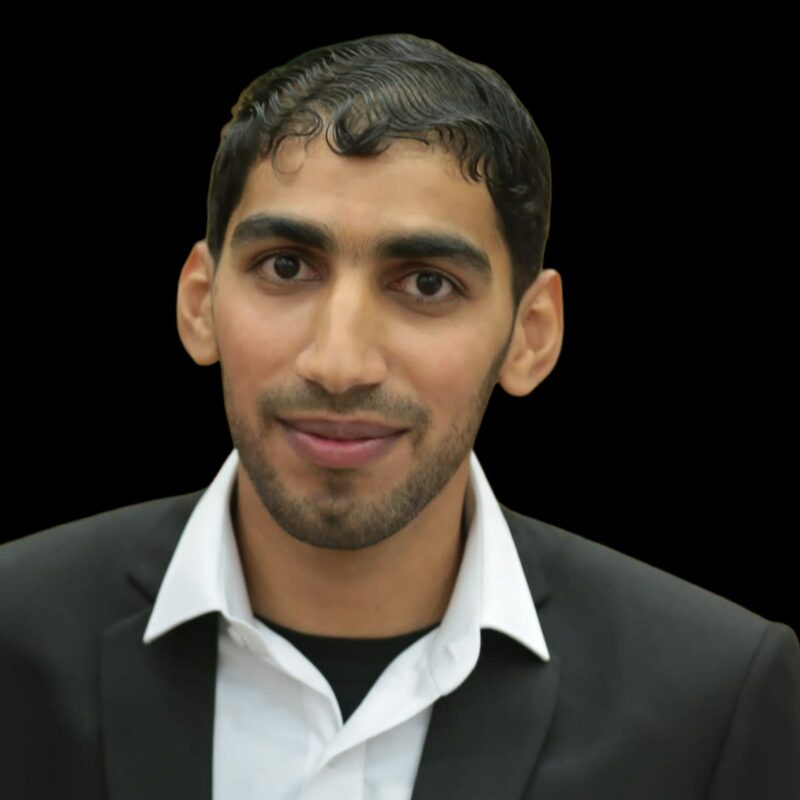Mohamed AlMutaghawi is a 33-year-old political prisoner who had been arbitrarily arrested at a protest in 2017, forcibly disappeared, and sentenced to death, later commuted to life imprisonment, in an unfair trial before the military court. He is currently serving his sentence in AlQurain Prison, where he continues to suffer from mistreatment.
On 23 May 2017, Interior Ministry police forces arrested Mohamed without presenting a warrant during a peaceful protest in Duraz. His family only learned of his arrest the following day when the Ministry of Interior published a statement regarding the suppression of the protest, sharing Mohamed’s pictures as one of the individuals arrested. In fact, Mohamed was only able to contact his family on 27 July 2017, in a call that lasted a few minutes, where he seemed apprehensive and did not disclose his whereabouts or wellbeing. As a result, Mohamed was forcibly disappeared for seven months, as his whereabouts were unknown until the trial. During his detention, officers allegedly subjected Mohamed to torture.
Mohamed was among the 17 civilians tried before the Bahraini High Military Court for the first time since 2011. The military courts are known for a lack of fair trials, opacity, and acceptance of torture-induced confessions. The defendants were charged with forming a terrorist cell and plotting to assassinate a military official, the Bahrain Defense Forces’ Commander-in-Chief. Some defendants in the trial were prevented from meeting with a lawyer until the third hearing in November 2017, and the court rejected defense counsel requests to re-examine suspects, question anonymous witnesses, and allow the defendants to speak during the initial appeal.
On 25 December 2017, the court found Mohamed guilty and sentenced him to death for the assassination attempt as well as 15 years of imprisonment. He was also stripped of his nationality. On 21 February 2018, the High Military Court of Appeals upheld Mohamed’s death sentence and prison term. Finally, on 25 April 2018, Bahrain’s highest military court, the Military Court of Cassation, rejected the final appeal to overturn the sentences. However, the King commuted Mohamed’s sentence to life imprisonment. Additionally, in 2019, Mohamed was sentenced to 10 years in prison in relation to his participation in the Duraz demonstration, on charges of inciting hatred against the government, unlawful assembly for the purpose of committing crimes, and attacking a public servant
In AlQurain Prison, Mohamed is only allowed one weekly phone call and one monthly visit. Although, from February 2020 until July 2021, visits were canceled due to the COVID-19 pandemic. Officers monitor the visits and calls closely. Mohamed is not allowed video calls but only regular voice calls. This falls within the authorities’ efforts to isolate Mohamed and his cellmates. They have no access to Television or any other form of connection with the outside world. Mohamed’s interaction is also limited to his cellmates, and they are not allowed to interact with other inmates.
Mohamed’s arbitrary arrest, forced disappearance, torture and trial in the military court are clear violations of the Convention against Torture and Other Forms of Cruel, Inhuman or Degrading Treatment or Punishment (CAT) and the International Covenant on Civil and Political Rights (ICCPR), both of which Bahrain is a party to. The government’s actions also explicitly violate recommendations that Bahrain accepted as part of its United Nations (UN) Universal Periodic Review (UPR) process, which called on the authorities to ensure that civilians are never again tried in military courts.
Americans for Democracy & Human Rights in Bahrain (ADHRB) urges the Bahraini government to repeal the constitutional amendment allowing the trial of civilians before the military court and hold a retrial for Mohamed before a civilian court, adhering to international standards of a fair trial. Moreover, ADHRB calls for an independent investigation into Mohamed’s allegations of torture and enforced disappearance, to hold perpetrators accountable. Finally, ADHRB demands that Mohamed is guaranteed all rights granted to prisoners and is allowed to engage with other inmates and the outside world through different forms of media, as stipulated in the Mandela Rules.





